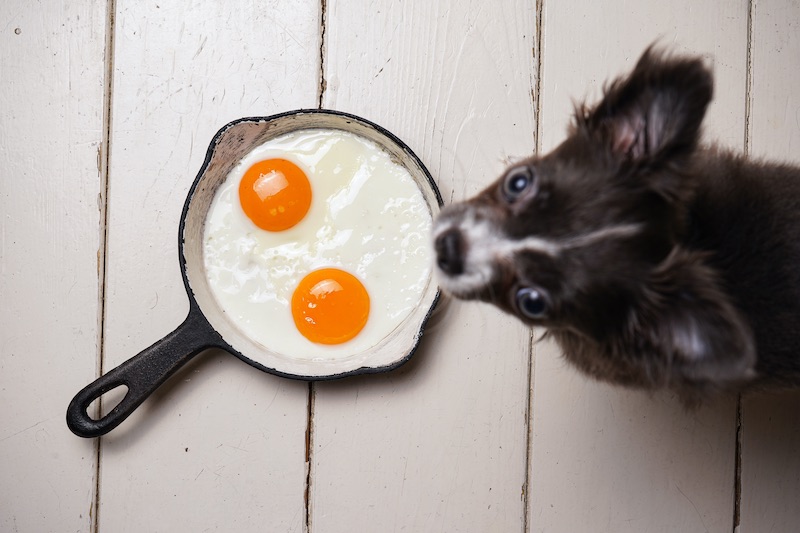Breakfast is the most important meal of the day, and eggs are an inexpensive and nutritious staple. But is it safe to let your dog eat with you when he starts staring eagerly at your fried or steamed egg? The answer is yes. Whether boiled or hard-boiled, eggs make a delicious treat or dietary supplement for your dog. Tip Make sure the eggs you serve are not seasoned with additives like salt or contained in omelets that contain onions or other potentially harmful ingredients. You also need to make sure the eggs are free of other additives, such as oil, butter, or pepper, that could be harmful to your dog. Your dog has a simple palate and will likely eat the last bite of eggs in his or her bowl without any seasoning. (Though a sprinkle of cheese on some scrambled eggs makes for a special treat). Egg Benefits for Dogs Eggs are high in protein, rich in several essential amino acids and fatty acids, vitamins including A and B12, as well as folic acid, iron, selenium, and riboflavin, all of which may provide a range of health benefits for dogs, including improved skin and apply health to stronger teeth and bones.
As such, eggs are a common ingredient in many homemade pet diets and are considered safe and nutritious for most dogs. However, while eggs can be safely added to your dog’s diet, they should never be their main source of nutrition. The general consensus is that eggs can be provided in moderation several times per week when used as a supplement to a high-quality commercial food or meat diet. How to Feed Your Dog Eggs While eggs are a safe “human food” for dogs, we still need to be cautious before offering eggs to pets, especially since overfeeding eggs can lead to health problems ranging from obesity to Salmonella and other diseases. While they’re packed with nutrients, eggs are also high in fat, so pet owners with overweight dogs should always stay in moderation when providing these protein powerhouses. Believe it or not, eggs are not only a healthy (and delicious) treat for your dog, but they can even help with tummy issues like chicken and chicken when kibble is too tough for their stomachs. Same as rice.

Dangers of Eggs to Dogs Historically, canines would snatch bird’s nests and eat entirely raw eggs — including crunchy shells — but of course, that’s not recommended for domestic pets today. Consuming raw or undercooked eggs poses inherent risks to your dog, just as it does to humans — and while these side effects may be relatively rare, veterinarians recommend cooking eggs before feeding them to dogs. Warning pets and their humans are at risk of contracting diseases such as salmonella from raw eggs.
1. Both animals and humans can be infected with Salmonella from raw eggs and meat or from contaminated dairy or agricultural products. Salmonella may appear on your pet with symptoms such as vomiting, fever, diarrhea (may be bloody) ), loss of appetite, or decreased activity levels. Pets with cancer, infection, or other serious health problems should especially avoid raw eggs, as their immune systems may not be able to cope with the risk of potential contamination.
2. Another lesser known danger of feeding eggs to pets due to prolonged feeding of raw egg whites is biotin deficiency, which is caused by an enzyme in egg whites that prevents biotin from being absorbed by the body. Biotin is a B-complex vitamin that promotes healthy skin, metabolism, digestion and cells in dogs and humans. Since egg whites contain these enzyme inhibitors that can interfere with digestion — especially in puppies and older dogs — eggs should always be offered to your dog in moderation. While it may take too many eggs to cause your dog to be deficient in biotin, veterinarians still warn against overdosing. And, as always, keep an eye on your pet for any signs of stomach pain to make sure your dog can tolerate eating those scrambled or hard-boiled eggs without any problems.























































